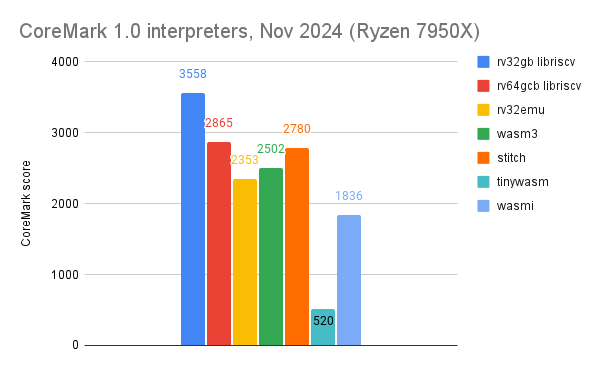Performance Benchmarks
libriscv is no slouch when it comes to performance, even in interpreter mode.
Interpreter performance
libriscv regularly out-performs other interpreters.



I benchmarked interpreted libriscv vs wasm3 on two of my machines. The CoreMark values are from running it in libriscv as well as the wasmi benchmark suite. I added the 64-bit CoreMark value from rv64gcb that isn't very flattering, however for many it's the default when using libriscv.
Others have also benchmarked libriscv, and found it to be fast. Although likely with C-extension enabled, which is not the fastest interpreter mode in libriscv.
In order to reach good performance with the interpreter mode, follow these guidelines.
Binary translation performance
The binary translator can be up to 30x faster than the interpreter mode.
Godot Sandbox performance
The Godot Sandbox is an extension to the Godot Engine. Godot uses GDScript for scripting inside the Godot Editor. GDScript is a dynamic, interpreted language. While the Godot Sandbox extension aims to allow modding in Godot, it also has good performance.

We can see that the Godot Sandbox using libriscv is 10x faster than GDScript at processing floats in this particular benchmark. 50x faster when using binary translation, and more when using memset32. A C jit-compiler called Mir was 4x faster than GDScript after being embedded into the Sandbox. TinyCC, a fast C compiler, can also be embedded into the Sandbox, and was 2.7x faster than GDScript. However, when a Godot engine helper function is used (fill(1.0) in this instance), GDScript can have native performance.
I took that as a challenge, and wrote a memset32 function that initializes the array with and then copies increasingly larger parts until done.
static inline void memset_i32(int *ptr, int value, size_t num) {
if (num == 0) return;
*ptr = value;
size_t start = 1, step = 1;
for ( ; start + step <= num; start += step, step *= 2)
memcpy(ptr + start, ptr, sizeof(int) * step);
if (start < num)
memcpy(ptr + start, ptr, sizeof(int) * (num - start));
}
Using that helper, we could match the Godot native-performance Array.fill() helper function. The reason this works is that functions like memcpy and memset are native performance in Godot Sandbox.
In any case, one should prefer to use the Godot native-performance helper functions when they are available. And if not, one can always outsource work to the Godot Sandbox.